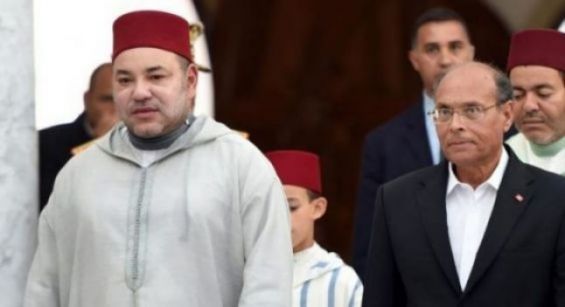Former Tunisian president Moncef Marzouki said that Saudi Arabia and the United Arab Emirates (UAE) «will never forgive» Morocco for allowing Islamists to lead the government following the Arab Spring protests.
Marzouki’s statement was shared, Sunday, in a video sent to the eleventh edition of the Maghreb Forum in the city of El Jadida, held from Friday to Monday January 20 by the Mada research center.
In this video, Marzouki, who was elected in 2011 as President of Tunisia by the Constituent Assembly, stressed that «Maghreb countries are threatened by what is currently happening in Libya». He believes that the situation in Libya is threatening to «all Maghreb countries, including Algeria, Tunisia and Morocco».
«The counter-revolution led by the United Arab Emirates, Saudi Arabia and Egypt targets Algeria, Tunisia and also Morocco», he claimed, adding that «these powers would never forget that His Majesty King Mohammed VI listened in 2012 to the demands of the people who took to the streets, and that he accepted that the government be led by Islamists».
Arab Spring, Saudi Arabia and the UAE
Moreover, Marzouki believes that to Riyadh and Abu Dhabi, having Islamists in the government is «unacceptable and must be revenged». Saudi Arabia and the UAE have been trying, since the start of the Arab Spring revolutions in 2011, to prevent Islamists from gaining power in Arab countries, he explained.
According to him, they reportedly helped «overthrow the late Egyptian president Mohamed Morsi», who belonged to the Muslim Brotherhood movement, and helped the «current Egyptian president Abdel Fattah al-Sisi to head the country».
The two countries, in addition to Egypt, back American-Libyan military commander Khalifa Haftar who leads a war against the UN-backed Government of National Accord in Libya.
The Moroccan-Saudi-Emirati relations entered a new turn in February 2019, after Morocco decided to recall its ambassador to Riyadh for consultations, days after Saudi Arabia published a media report talking about a Moroccan «invasion of the Sahara» in 1975.
Moreover, Morocco had previously announced a «change in its participation» in the Saudi-led war in Yemen, and it maintained neutrality in the Gulf crisis between Qatar on the one hand and Saudi Arabia, UAE, Bahrain and Egypt on the other hand.




 chargement...
chargement...












